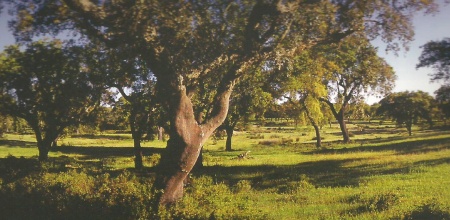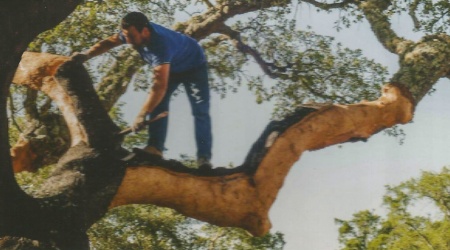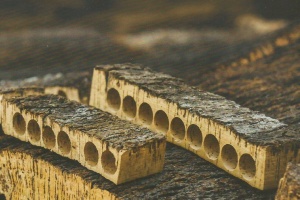
Cork oak forest (Quercus suber) in Portugal
For many years, Quercus suber or cork oak as it is commonly known has been cultivated in Portugal for its thick and spongy bark. The cork oak ecosystem in this country has high biodiversity of plants and animals with evergreen trees which are covered by silvery lichen. These plants are well adapted to the hot and dry weather of southern Europe. Portugal is the world’s leading producer of cork, thus there are European programs put in place to protect the trees and help farmer’s plant new stands.
Role played by cork oak in Portugal:
Employment:
These trees provide a source of income to people who live in the nearby farmsteads and towns at the hilltop. There are many foresters who earn a living by stripping off the outer layer of the trees. In addition, there are about 500 factories in the country which offer employment to more than 20,000 workers. A typical family cork farm of about 1, 400 acres can produce 45 tons of the tree bark. This can be used as wine stoppers because of the unique properties such as;
- Resistant to rot
- Light in weight
- Impermeable to liquid and gas
- Termite resistant
- Resistant to fire
- It is soft and buoyant
Nutrition:
Acorns are fruits gotten from cork which have high nutritional value not only for humans but also birds, pigs and other mammals. Acorns from white oaks are low in tannin and high in proteins and carbohydrates. The nut fruits can be ingested in any of the following forms;
• Boil the whole fruit before eating
• Grind into flour then baked
• Roast and add in coffee drink

Harvesting the bark of a cork tree requires skill not to harm the tree
Trade:
Cork counts for about 16% of all Portuguese export trade. The evergreen plantations in Portugal bring in foreign exchange from tourists who travel all the way to see the cork oaks. Besides the production and export of cork stoppers with account to 70% of the value of the exports of cork, foreign exchange is also earned from the export of acorns and other cork products like cork message boards, printing paper, shoe soles, handles for fishing rods, cigarette tips, hat bands, table mats and cork tile flooring to foreign countries. The main consumer markets are;
• Germany
• United Kingdom
• United States of America
• Australia
• Brazil
• Canada and others
Land use
Growing and harvesting cork stands offers traditional and sustainable use of land in Portugal. There are many commercial and individual cork farms. The land also acts as a precious habitat for endangered species like Iberian imperial eagle and Iberian lynx. These animals are valued and protected in cork forests. The cork oaks provide use for land that would otherwise have not been as productive given the weather conditions in the area.

Cork bark used for wine stoppers
Conservation
Oaks play an important role of environmental conservation in Portugal. The forests are important in both conservation and economic development in the following ways;
• Preventing soil erosion
• Maintenance of watersheds
• Keeping the soils healthy
With all these roles played by cork, you might wish to visit southern Portugal and experience things first hand. Cork offers a good business opportunity for entrepreneurs.
Author Bio:
Mira Jasmin is an enthusiastic blogger from Manchester, UK. In her extra time, she composes articles on different subjects, for example, engineering, and contraptions, travel…etc. Starting now she is concentrating on Turkish visa , which is a non-legislative online application administration for getting an e-Visa to enter Turkey.
Photo Credits: Corticeira Amorim, the largest world producer of cork products
